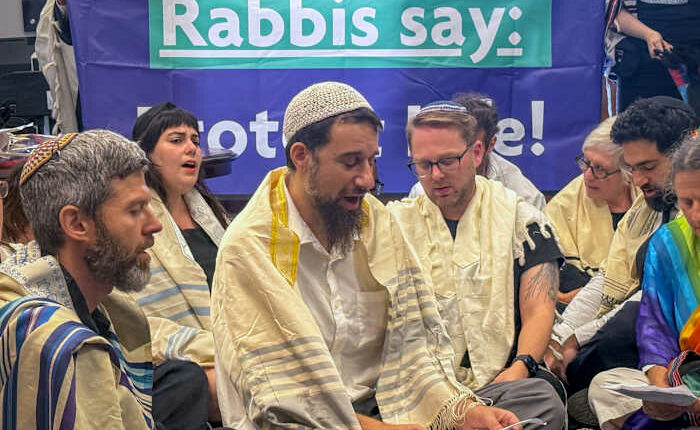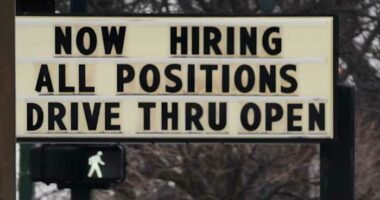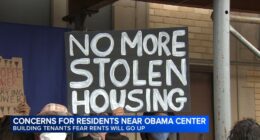Share this @internewscast.com

Traditionally, supporting Israel has been a fundamental principle for many Jewish Americans, regardless of their political beliefs. However, in response to the humanitarian issues in Gaza, a significant number have been calling on the Israeli government to improve the distribution of essential supplies like food and medicine.
The opinions vary widely. On one side, some left-leaning U.S. Jews accuse Israeli Prime Minister Benjamin Netanyahu’s government of committing genocide. Conversely, some conservative Jewish media argue that the reported food crisis in Gaza is overblown or fabricated.
Nevertheless, more American Jews are increasingly uneasy about the situation in Gaza, including prominent organizations that typically refrain from criticizing Israeli policies.
What are major Jewish organizations saying?
The American Jewish Committee, a key advocacy organization representing Jews both in the U.S. and globally, expressed its backing of Israel’s legitimate efforts to neutralize the threat from Hamas.
The AJC conveyed its sorrow over the war’s severe impact on Palestinian civilians and voiced alarm over the escalating food shortages in Gaza. It called on Israel and other influential entities to boost cooperation to ensure aid reaches those in Gaza who need it most.
The Rabbinical Assembly, a New York-based organization representing rabbis of the Conservative Movement, sounded a similar note.
The assembly acknowledged that while Hamas could alleviate this crisis by releasing hostages and caring for civilians, the Israeli government has a responsibility to do all it can to ensure that humanitarian aid is delivered. The Jewish tradition emphasizes the critical importance of delivering food, water, and medical supplies.
Rabbi Moshe Hauer, executive vice president of the Orthodox Union, told The Associated Press he and his colleagues “are proud, sad, and angry. ”
“We remain proud of Israel and its army, the only moral fighting force in the region striving to abide by internationally accepted laws of war,” he said via email. “We are genuinely sad about the mounting human costs which — as intended by Hamas — this war is inflicting on Israelis and innocent Palestinians. And we are angry at those who only ascribe to Israel the worst intentions and all responsibility while ignoring Hamas’ inhumanity.”
Of major nationwide organizations, perhaps the most vehement statement came from the Reform Jewish Movement, which represents the largest branch of Judaism in the U.S.
“Hamas has repeatedly demonstrated its willingness to sacrifice the Palestinian people in its pursuit of Israel’s destruction, but Israel must not sacrifice its own moral standing in return,” the Reform statement said.
“No one should be unaffected by the pervasive hunger experienced by thousands of Gazans,” it continued. “Nor should we accept arguments that because Hamas is the primary reason many Gazans are either starving or on the verge of starving, that the Jewish State is not also culpable in this human disaster.”
Rabbis share their thoughts
Over the past few weeks, as images and reports of starvation and violence in Gaza dominated the news cycle, Rabbi Jon Roos felt a shift in how the Israel-Hamas war is discussed in Jewish circles.
“There was a real change in the tone of the conversation, but also in the depth and content of it,” said Roos, who leads Temple Sinai, a Reform synagogue in Washington, D.C. “I felt it from members of the congregation. I’ve felt it in the Jewish communal world.”
The clergy of Temple Sinai signed onto a letter with more than 1,000 Jewish clergy calling on the Israeli government to “allow extensive humanitarian aid” to enter Gaza. It stated that “we cannot condone the mass killings of civilians … or the use of starvation as a weapon of war.”
Roos said the Jewish community can hold two truths at once: that Oct. 7 was deplorable and so is the situation in Gaza.
“One of the critical parts of Judaism is that we really value that ability to hold nuance and two truths, even if they’re both incredibly challenging and self-critical,” Roos said.
Rabbi Aaron Weininger in Minnetonka, Minnesota, also signed the clergy letter. He leads Adath Jeshurun, a Conservative Jewish congregation.
“Zionism is big enough and strong enough to care about the safety, wellbeing, and dignity of Israelis and Palestinians. Naming their suffering doesn’t weaken Zionism nor does calling on members of the government not to occupy Gaza. Signing the letter honors Zionism as compassionate and just,” he wrote in an email.
The response of his community has been largely positive, with some disagreement — “both with the idea of publicly disagreeing with the Israeli government and with the characterization of suffering in Gaza,” he wrote. “But taking moral stands and holding disagreement have always been part of what it means to be a faith community.”
Voices of protest
On Tuesday, more than two dozen rabbis were arrested in the office of the Senate majority leader, John Thune, R-S.D., while demanding action by Congress to provide food aid for Gaza.
“All life is sacred, but Palestinian lives are not treated as such, and that is a blot on our collective humanity,” said one of the protesters, Alissa Wise, who is founding director of Rabbis for Ceasefire. “We are here to insist on the sanctity of life of every Palestinian, of every Israeli, of all of us.”
Also arrested was a New York-based rabbi, Andrue Kahn. He is executive director of the American Council for Judaism, which rejects the concept of Zionism.
In an email, Kahn said an increasing number of U.S. Jews, including rabbis, are now more willing to speak out about Gaza’s plight and demand policy changes from Israel.
“The horrors of starvation of so many people … has led to the dam bursting for many people, and the political spectrum of those speaking out has broadened,” he wrote.
Defenders of Netanyahu’s policies
A Jewish member of Congress, Rep. Randy Fine, R-Fla., incurred criticism after suggesting in a post on X last week that the reports of a Gaza food crisis were false.
“Release the hostages. Until then, starve away. (This is all a lie anyway. It amazes me that the media continues to regurgitate Muslim terror propaganda.),” his post said.
Two U.S.-based Jewish news outlets also have depicted the food crisis as exaggerated.
“The reality is clear — food and medicine are entering Gaza, but Hamas seizes them for its own purposes. The international community’s fixation on blaming Israel ignores this fundamental truth,” said an article in The Jewish Voice.
Supplementing its news articles making similar points, the Jewish News Syndicate on Wednesday ran a column by Mitchell Bard, executive director of the American-Israeli Cooperative Enterprise.
“True supporters of Israel are not fair-weather friends who abandon their ally out of fear of what their friends will think of them or the need to feign moral superiority,” he wrote. “Israelis are not children in need of a public scolding from the Diaspora. They need solidarity, not sanctimony.”
___
Associated Press religion coverage receives support through the AP’s collaboration with The Conversation US, with funding from Lilly Endowment Inc. The AP is solely responsible for this content.
Copyright 2025 The Associated Press. All rights reserved. This material may not be published, broadcast, rewritten or redistributed without permission.











